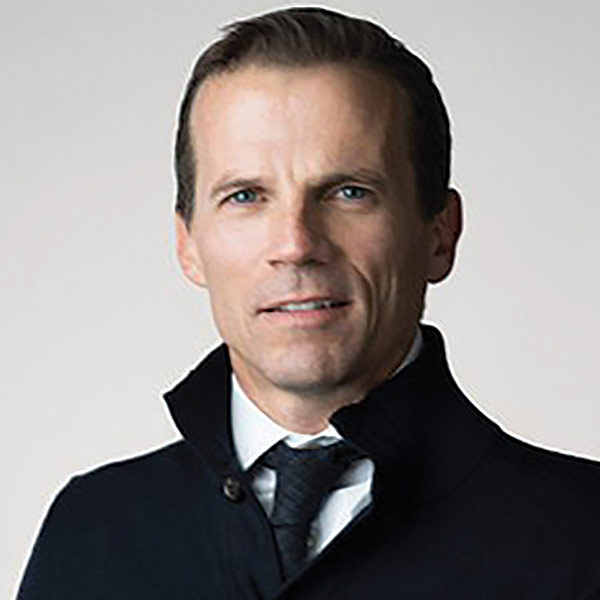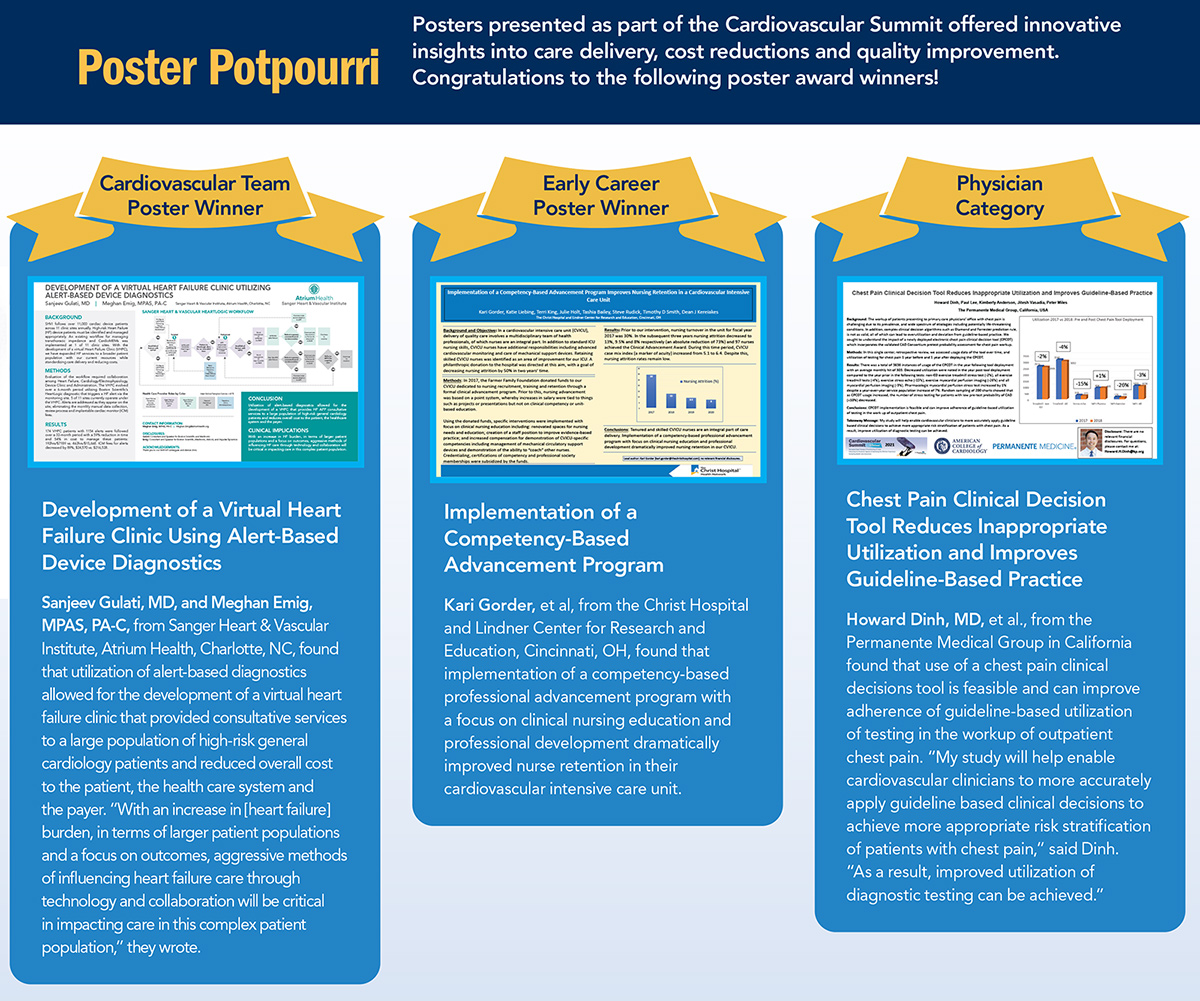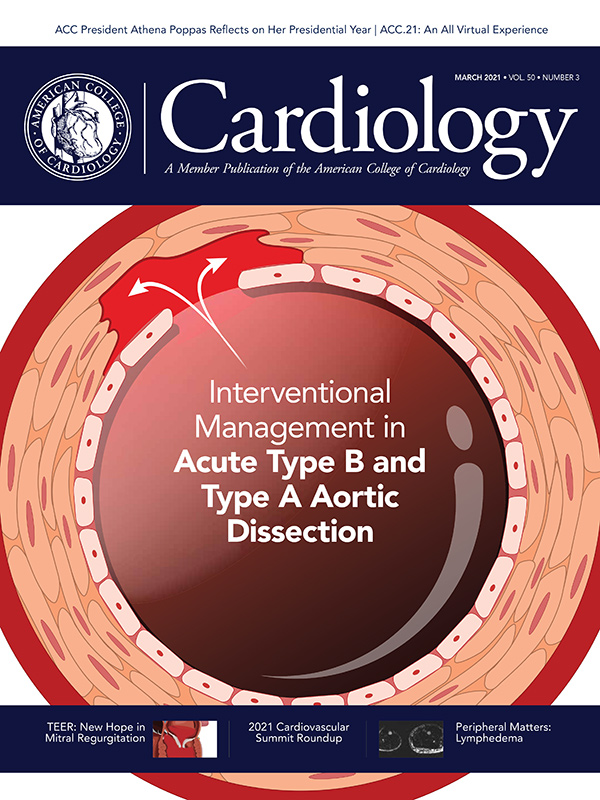Feature | ACC Cardiovascular Summit: Lessons in Nonclinical Competencies

How to best manage rapid change, navigate health care economics and optimize the clinician experience were among the primary goals of the ACC's first-ever, all-virtual Cardiovascular Summit last month. These topics, coupled with looking at innovative ways to transform cardiovascular care and enhance the academic agenda, were all the more important given the unprecedented turmoil and uncertainty posed by the ongoing COVID-19 pandemic.
"The purpose of the course is to go over those issues in business and leadership that are traditionally not covered well in traditional medical education," said Course Director Howard T. Walpole Jr., MD, MBA, FACC, as part of the opening session. "We put a lot of effort into late-breaking issues and concepts that have come up over the last several months, including legal and business management areas, Stark Law and more."
Walpole and Co-Course Directors Geoffrey Rose, MD, FACC, and Cathleen Biga, MSN, FACC, created a robust, multipronged agenda that kicked off with a three-session pre-conference series offering a primer on the economics of cardiovascular practice. From there, two days of dedicated programming featured plenary speakers, interactive workshops, and mini-intensives that offered tangible solutions to the business challenges faced by clinicians due to both COVID-19 and the ongoing transition to value-based care.
Specific sessions addressed important nonclinical topics like dyad relationships, physician scorecards, how to best incorporate the entire cardiovascular team into care delivery, and tips for ensuring a functional cardiovascular service line. Telehealth and physician compensation, whether navigating the 2021 Medicare Physician Fee Schedule or creating a winning package for the academic cardiologist, were the focus of the two mini-intensives.


Additionally, plenary speakers like Christopher Fussell, president of the McChrystal Group, and Anthony S. Fauci, MD, director of the National Institute of Allergy and Infectious Diseases, offered their advice and insights into managing and leading through change. Fussell shared his "team of teams approach" to mobilizing and operationalizing rapid change, which includes developing a strategy that goes beyond traditional metrics for success to incorporate culture. He stressed the importance of building credibility among internal and external stakeholders and incorporating a cross-team communications structure that allows for accelerated speed and transparency, as well as decentralized decision-making.
Fauci shared his first-hand perspectives on both the HIV/AIDS and COVID-19 pandemics, noting the similarities with asymptomatic infection and health disparities, as well as lessons learned in non-vaccine prevention and vaccine development and rollout. "Advances in HIV vaccinology have paved the way for COVID-19 vaccinology," he said. He also stressed the importance of turning adversaries into allies as a means of combatting denialism – advice that ACC Vice President Dipti Itchhaporia, MD, FACC, noted as particularly critical for clinician leaders.
Outside of the scheduled sessions, bonus on-demand content featuring deeper dives with experts on a wide range of topics was a new part of the Summit for 2021 and available with all the other content through April 30. For example, a focused payment reform session looks at ways the policy side of health care continues to move forward, despite the pandemic. Other sessions look at ways to incorporate lessons learned from COVID-19 to cardiovascular management and tips for using the cardiovascular care team to optimize care for diverse patient populations.
"The lessons learned from this year's Cardiovascular Summit will serve us all well as we continue to navigate the COVID-19 public health emergency, while also charting us on a course that will help us learn from the past year and prepare for the future," said ACC President Athena Poppas, MD, FACC, during her welcome remarks.

In addition to the poster winners, other poster highlights include:
Rapid Adoption of Virtual Outpatient Cardiology Care During COVID-19
Following stay-at-home orders in March 2020 in Oregon, a large, integrated cardiology practice with 22 sites moved to implement virtual (telephone and video) platforms while providing patient, provider and staff education. After the stay-at-home order was lifted in June 2020, the institution continued to provide hybrid care to accommodate patients' needs. In a retrospective review of changes from January to October 2020, the institution saw a slight decline in total encounter volumes in March, which recovered in April. Virtual visits went from 0% prior to March to 98% in April, allowing the institution to mitigate care disruption that would have otherwise occurred. In subsequent months the hybrid model stabilized with more than 30% virtual care after the stay-at-home order lifted. According to the researchers, a hybrid model adoption is a potential long-term option to ensure access and efficiency of cardiology care.
Co-Designing an Intervention for Transformation of Cardiovascular Care Delivery in Rural Settings
The needs and resources available to rural patients with cardiovascular disease are different than their urban and suburban counterparts. To that end, a multidisciplinary team in Minnesota developed an intervention to enable rural primary care teams to improve the cardiovascular health of patients with atherosclerotic cardiovascular disease (ASCVD). The team designed an intervention that included adapting existing technology to deliver guideline recommendations to primary care practices and observed clinical encounters, as well as interviewed patients and conducted workshops with rural care team members to develop feasible intervention concepts. The collaboration resulted in workflows and a clinical decision-support tool that identifies patients with ASCVD who would benefit from additional care touchpoints, aggregates crucial medical information for clinical decision-making and assigns the appropriate care team role to determine care plans. The process developed an intervention that combines novel responsibilities, workflows and technology while recognizing capacities and limitations of rural clinics.
Optimizing Emergency Room Use During After-Hour Triage Calls
After-hour triage calls at an ambulatory clinic are managed by a telehealth service of Registered Nurses (RN). The RNs follow an accepted protocol for each patient interaction leading to many of these patients being directed to the emergency room (ER), often for an unwarranted visit. However, in an effort to reduce unnecessary utilization of health care resources in response to COVID-19 pandemic, the clinic implemented a new care coordination process that reduced ER referrals and hospital admissions while also better utilizing health care resources.
Take Advantage of Virtual
All content from ACC's Cardiovascular Summit, including access to poster presentations, the virtual Expo, and quick links to engage with the College, is available through April 30. Take advantage of the virtual experience to review sessions or watch for the first time and hone your ability to:
- Employ leadership strategies that foster collaboration, teamwork and inclusivity
- Describe core elements of cardiovascular service line operational best practices necessary for financial sustainability
- Recognize the elements of a financially viable team-based care model
- Distinguish essential elements of sustainable compensation models for physicians, care team providers and administrators
- Outline regulatory requirements and their impact on the cardiovascular service line
- Practice innovative approaches that align with a rapidly changing external environment
- Implement best practices that will sustain workforce well-being
- Discuss key elements required to prepare academic cardiologists for a value-based world
Clinical Topics: Cardiovascular Care Team, COVID-19 Hub, Heart Failure and Cardiomyopathies, Acute Heart Failure
Keywords: ACC Publications, Cardiology Magazine, COVID-19, Ambulatory Care, Asymptomatic Infections, Awards and Prizes, Benchmarking, Cardiovascular Diseases, Chest Pain, Decision Support Systems, Clinical, Delivery of Health Care, Diagnostic Techniques and Procedures, Education, Nursing, Education, Medical, Fee Schedules, Emergency Service, Hospital, Heart Failure, Hospitals, HIV Infections, Goals, Intensive Care Units, Leadership, Medicare, National Institute of Allergy and Infectious Diseases (U.S.), Nurses, Organizations, Outpatients, Outpatients, Pandemics, Patient Care Team, Physicians, Policy, Primary Health Care, Public Health, Quality Improvement, Referral and Consultation, Retrospective Studies, Risk Assessment, Technology, Telemedicine, Triage, Vaccines, Uncertainty
< Back to Listings

